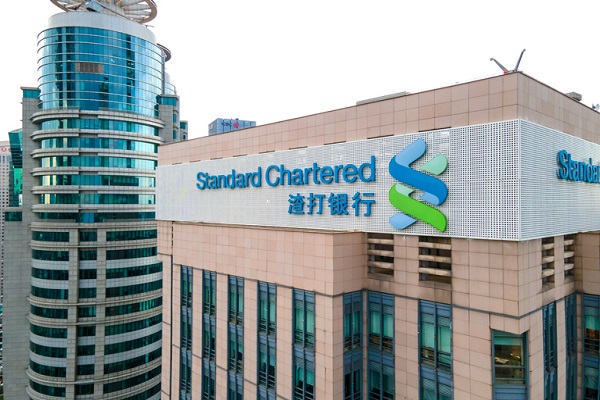ii view: Standard Chartered benefits from rising rates and China
26th April 2023 15:39
by Keith Bowman from interactive investor
This Asia-focused FTSE 100 bank has comfortably outperformed UK focused Lloyds Bank over the last year. We assess prospects.

First-quarter trading update to 31 March
- Currency adjusted income up 13% to $4.39 billion
- Adjusted or underlying profit up 25% to $1.7 billion
- Capital cushion or CET1 of CET1 ratio 13.7%, down from 14% in Q4
- $1 billion 2023 share buyback programme
Chief executive Bill Winters said:
"Business performance continues to improve across our markets and products and has been achieved in what continues to be an uncertain environment. We remain highly liquid and strongly capitalised with a CET1 ratio towards the top of our target range.
“We remain optimistic about our continued strong performance and now expect 2023 income to grow around 10 per cent, the top end of our range, and remain confident in the delivery of all of our financial targets, including our return on tangible equity targets."
ii round-up:
Asia-focused Standard Chartered (LSE:STAN) bank today detailed quarterly results at the upper end of analyst expectations, as it benefitted from both rising interest rates and a reopening of China’s economy following the pandemic.
- Invest with ii: Top UK Shares | How to Start Trading Stocks | Open a Trading Account
An 18% gain in net interest income following higher global interest rates helped push overall group income up 13% on a currency adjusted basis to $4.4 billion.
Shares in the FTSE 100 bank rose by around 2% in UK trading, having come into this latest news up by almost a third over the last year. Rival HSBC Holdings (LSE:HSBA) is up by a fifth over that time, while UK mortgage lender Lloyds Banking Group (LSE:LLOY) is up 5%.
In early January, Standard Chartered confirmed that First Abu Dhabi Bank had previously been assessing a potential takeover of Standard but was not no longer doing so.
Adjusted profit for its core Asian business and including China rose 74% from the same quarter last year to almost $1.4 billion. China related income rose 4% year-over-year with offshore related income up 67%.
Group wide credit impairment charges fell $172 million year-over-year to $26 million, although its currency adjusted expenses climbed 10% to $2.7 billion.
Against a backdrop of concerned failures for regional US banks, Standard’s own deposits stayed stable at $462 billion, with its capital cushion or CET1 ratio of 13.7% down only marginally from 14% at the end of 2022.
At its full year 2022 results announced in mid-February, Standard announced a new $1 billion share buyback programme for 2023 which is now ongoing.
ii view:
Headquartered in the UK, Standard Chartered operates across 50 plus countries, primarily in Asia. In 2022, Asia accounted for almost 70% of group income during 2022 with the balance split relatively evenly between Africa and the Middle East and Europe and the Americas.
- A game-changing move for NatWest's share price
- UK bank shares: what to expect from Q1 results 2023
- Insider: big spending on company in ‘foothills of growth journey’
Employing more than 80,000 people, the company operates across the three divisions. Corporate, Commercial and Institutional Banking accounts for its biggest slug of income at 55%, followed by Consumer Private and Business Banking at 31% and Central and Other the balance. Its strategic priorities are focused on streamlining operations, embracing digitisation, and investing to accelerate growth.
For investors, exposure to Asia, and Hong Kong and China in particular, is not without risk given increasingly strained relations between the West and China. Fears that the US may soon sign an executive order to tighten the rules on investments by US companies in key parts of China’s economy warrant consideration. So do rising group costs and the impact which currency changes can have.
On the upside, exposure to expected future economic growth across Asia over coming years is important. Management’s focus on improving efficiency saw its return on tangible equity rise 1.7% year-over-year to 11.9%, takeover speculation could again be seen, while a $1 billion share buyback programme and forecast dividend yield of around 3% provide consideration for shareholder returns.
On balance, and while some caution looks sensible given the importance of China to the Asia region, a consensus analyst estimate of fair value at over £8 per share provides room for continued hope.
Positives:
- Both business type and geographical diversity
- Executing a $1 billion share buyback programme
Negatives:
- Strained Western relationship with China
- Elevated costs
The average rating of stock market analysts:
Strong hold
These articles are provided for information purposes only. Occasionally, an opinion about whether to buy or sell a specific investment may be provided by third parties. The content is not intended to be a personal recommendation to buy or sell any financial instrument or product, or to adopt any investment strategy as it is not provided based on an assessment of your investing knowledge and experience, your financial situation or your investment objectives. The value of your investments, and the income derived from them, may go down as well as up. You may not get back all the money that you invest. The investments referred to in this article may not be suitable for all investors, and if in doubt, an investor should seek advice from a qualified investment adviser.
Full performance can be found on the company or index summary page on the interactive investor website. Simply click on the company's or index name highlighted in the article.